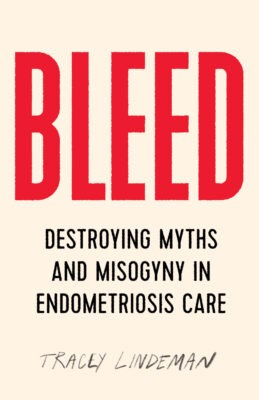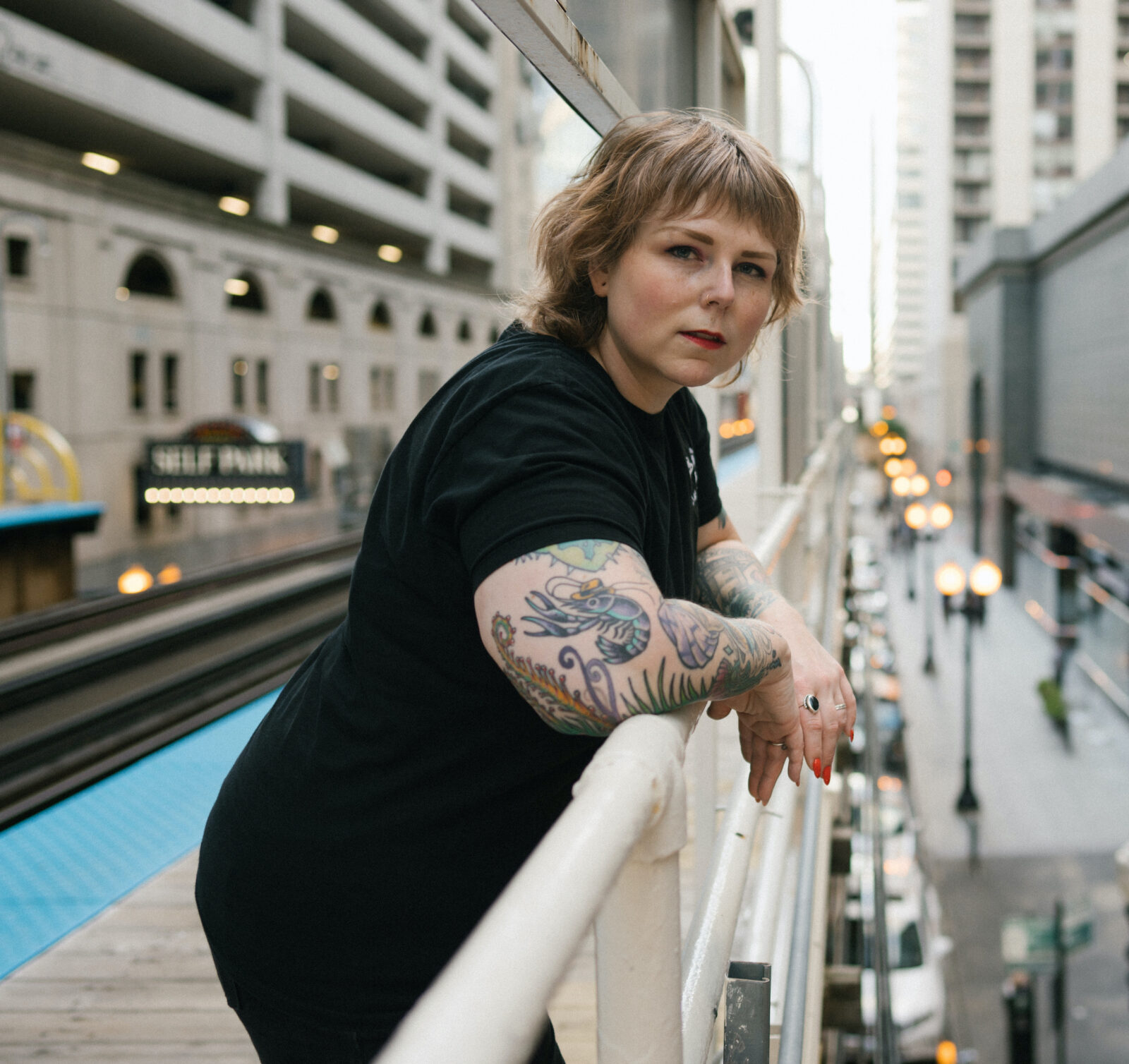B
LEED is not a self-help book, but it can teach you how to become the perfect endo patient: be thin, white, cis, straight. Have kids, or at least want them someday. Be polite. Don’t cry. And never, ever question your doctor’s advice.“You’ve got to play the game, but it’s a game you can’t win,” says a characteristically blunt Tracey Lindeman from her Gatineau home. “Because the system isn’t made for you.”
It’s a system Lindeman, now in her late thirties, has been navigating since she was eleven, quietly unwrapping a maxi pad in the school washroom, wondering how much blood and pain are “normal.” BLEED, her first book, follows her quest to find the source of her chronic pain, get officially diagnosed with endometriosis, and obtain a hysterectomy – all while begging for basic empathy from healthcare workers.
Endometriosis is, to put it simply (and it’s hardly simple), a disease where uterine-like tissue appears in and wreaks havoc on other organs, from the fallopian tubes to the bowels, even the lungs and brain, resulting in cysts, scarring, sexual and digestive issues, migraines, and a dizzying array of related chronic pain. An estimated ten percent of people with uteruses have it. There is no known cure and no agreed-upon cause.
With almost 700 citations and dozens of interviews with endometriosis patients, BLEED is as much an investigative report as a medical memoir, and Lindeman attacks her understudied, “feminized illness” from every angle. “I had to make an airtight case,” she says, likening the writing process to pleading her case to doctors. It turns out being a journalist prepared her well for navigating the medical system. Analyzing studies, recording meetings, filing Access to Information requests. Plus perfecting, in her words, “the craft of being a pain in the ass.”

BLEED
Destroying Myths and Misogyny in Endometriosis Care
Tracey Lindeman
ECW Press
$24.95
paper
320pp
9781770416536
“Doctors might only see a patient with your condition a few times a year; you’ve got to live with it full-time,” Lindeman points out in our interview. But coming in armed with information can backfire, too, she cautions, prompting accusations of drug-seeking behaviour or “consulting Dr. Google.” It’s a perpetual double-bind that’s all part of that same game. If you’re a mess, it’s suspicious. If you’re thriving, things can’t be that bad.
Lindeman’s voice is so valuable because she seems to be thriving, from afar: writing for outlets like The Atlantic and the CBC, teaching journalism, getting a book deal, travelling to punk shows. Her gritted teeth would be easy to ignore if she weren’t so willing to spill her guts, inviting readers into her most vulnerable, visceral moments. An excruciating IUD insertion. Hemorrhaging five-inch chunks of tissue. Being left alone on an exam table by a nurse, transvaginal ultrasound probe inserted, door wide open.
If this sounds like a horror story, Rosemary’s Baby meets Alien, that’s because it often is. BLEED is not for the faint of heart. But then, neither is endo.
“None of the sufferers I interviewed for BLEED have a nice, neat ending to their stories.”
That Lindeman’s gruesome, gory, and often funny descriptions are so rare is worth reflecting on. Why is this messy reality, even in its more “normal” incarnations (like dysmenorrhea – a.k.a. painful periods) so often euphemized for the comfort of others? And if some people’s concept of menstruation is little more than “that time of the month,” is it any wonder feminized illnesses remain just as deliberately mystified, not to mention underfunded?
A note, too, about the terms “feminized illness” and “medical misogyny.” Lindeman deliberately interviewed a cross-section of people living with endometriosis: cis women, trans men, nonbinary people assigned female at birth, across a range of ethnicities and body sizes. It’s a clear, empathetic approach that highlights the value of both shared experiences and the trauma unique to different groups and individuals, reminders that “we’re all in the same water, but some of us are closer to the shore.” Two things can be true. Simply being considered (or dismissed as) “woman adjacent” is enough to feel the effects of medical misogyny, with the added bonus of dysphoria for some.
While Lindeman knows her primary audience will be people with endo (or similar illnesses like Polycystic Ovary Syndrome), she challenges those without it to read BLEED. Because, statistically, everyone has a friend, colleague or loved one with endo, even if they don’t know it. And though the value of simple validation can’t be overstated, she wants her book to spur concrete changes in Canada. To get endometriosis acknowledged as a disability, to push politicians to create a national action plan similar to those in Australia and France. Because while BLEED border-hops a lot, Lindeman is careful to take specific aim at her home country’s healthcare system, including Canadians’ naiveté about reproductive rights, and how the chronically ill are (not) cared for – issues that will no doubt only become increasingly relevant.
“None of the sufferers I interviewed for BLEED have a nice, neat ending to their stories,” writes Lindeman, herself included. She finally got a hysterectomy, ten years after first requesting it, and is now dealing with menopause in her late thirties (another condition the Canadian medical system is woefully unprepared for). She doesn’t have a dedicated family doctor, so visits often start from square one. During a recent appointment, she was asked to rate her pain on a scale of one to ten, and she says she almost lost it. “I was like, ‘Are you serious? My four is not another person’s four… so what is the point?’” When she sought treatment for a hand injury, she was told to simply avoid using it for the next few months – during her book tour for BLEED. Then she was prescribed (you guessed it) Naproxen. When she explained that she’d been taking it by the handful for decades – that she took it so much it gave her severe leg cramps, that it never really worked in the first place – she was met with disbelief and condescension.
Even now, when she’s literally written the book on her illness, it’s clear Lindeman still can’t quite be trusted with her own lived experience. And that’s just it. While her voice can effect change, BLEED is an acknowledgment that she can’t do it alone – not in a system that never counted on her speaking up at all.mRb
Photo: Benjamin Cruz







0 Comments